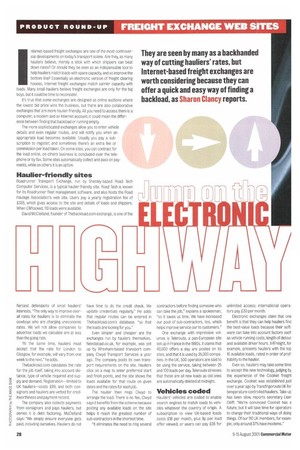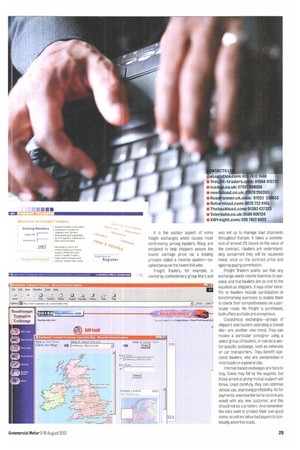nternet-based freight exchanges are one of the most controversial developments
Page 28

Page 29

If you've noticed an error in this article please click here to report it so we can fix it.
on today's transport scene. Are they, as many hauliers believe, merely a stick with which shippers can beat down rates? Or should they be seen as an indispensable tool to help hauliers match loads with spare capacity, and so improve the bottom line? Essentially an electronic version of freight clearing houses, Internet freight exchanges match carrier capacity with loads. Many small hauliers believe freight exchanges are only for the big boys, but it could be time to reconsider.
It's true that some exchanges are designed as online auctions where the lowest bid price wins the business, but there are also collaborative exchanges that are more haulier-friendly. All you need to access them is a computer, a modem and an Internet account: it could mean the difference between finding that backload or running empty The more sophisticated exchanges allow you to enter vehicle details and even regular routes, and will notify you when an appropriate load becomes available. Usually you pay a sub scription to register, and sometimes there's an extra fee or commission per load taken. On some sites, you can contract for the load online, on others business is concluded over the telephone or by fax. Some sites automatically collect and pass or payments, while on others it is an option.
Haulier-friendly sites
Roadrunner Transport Exchange, run by Stanley-based Road Tech Computer Services, is a typical haulier-friendly site. Road Tech is known for its Roadrunner fleet management software, and also hosts the Road Haulage Association's web site. Users pay a yearly registration fee of £365, which gives access to the site and details of loads and shippers. When CMlooked,113 loads were available.
David McClelland, founder of Thebackload,com exchange, is one of the fiercest defendants of smaii hauliers' interests. "The only way to improve overall rates for hauliers is to eliminate the cowboys who are charging uneconomic rates. We will not allow companies to advertise loads we calculate are at less than the going rate.
'At the same time, hauliers must accept that the rate for London to Glasgow, for example, will vary from one week to the next," he adds.
Thebacktoad.com calculates the rate for the job itself, taking into account distance, type of vehicle required and supply and demand. Registration—limited to
UK haulierscosts £99, and both consignors and hauliers are vetted for creditworthiness and payment record.
The company also collects payments from consignors and pays hauliers, but denies it is debt factoring, McClelland says: "We simply ensure everyone gets paid, including ourselves. Hauliers do not have time to do the credit check. We update credentials regularly." He adds that regular routes can be entered in Thebackload.com's database, "so that the loads are looking for you."
Even simpler and cheaper are the exchanges run by haulers themselves. Needaload.co.uk, for example, was set up by Wrexham-based transport company Clwyd Transport Services a year ago. The company posts its own transport requirements on the site. Hauliers click on a map to enter preferred start and finish points, and the site shows the loads available for that route on given dates and the rates for each job.
The haulier then rings Clwyd to arrange the load. There is no fee, Clwyd says it beneras from the scheme because posting any available loads on the site helps it reach the greatest number of sub-contractors in the shortest time. contractors before finding someone who can take the job," explains a spokesman, "so it saves us time. We have increased our pool of sub-contractors, too, which helps improve service our to customers."
One exchange with impressive volumes is Teleroute, a pan-European sfte set up in France in the 1980s. It claims that 40,000 offers a day are posted on its sites, and that it is used by 35,000 companies. In the UK, 500 operators are said to be using the service, taking between 25 and 100 loads per day. Teleroute stresses that these are all new loads as old ones are automatically deleted at midnight.
Vehicles coded
Hauliers' vehicles are coded to enable search engines to match loads to vehicles whatever the country of originA subscription to view UK-based loads costs £18 per month, plus 9p per load offer viewed, or users can pay £35 for
unlimited access; international operators pay £30 per month.
Electronic exchanges claim that one benefit is that they can help hauliers find the best-value loads because their software can take into account factors such as vehicle running costs, length of detour and available driver hours. X4Freight, for example, presents hauliers with the top 10 available loads, rated in order of profitability to the haulier.
Even so, hauliers may take some time to accept this new technology, judging the experience of the Coolnet freight exchange. Coolnet was established just over a year ago by Transfrigoroute UK for temperature-controlled hauliers. Take-up has been slow, reports secretary Liam Riff: "We're convinced Coolnet has a future, but it will take time for operators to change their traditional ways of doing things. Of our 110 UK members, for example, only around 37% have modems." It is the auction aspect of some freight exchanges which causes most controversy among hauliers. Many are designed to help shippers secure the lowest carriage price via a bidding process called a reverse auction—socalled because the lowest bid wins.
Freight Traders, for example, is owned by confectionery group Mars and was set up to manage load shipments throughout Europe. It takes a commission of around 2% based on the value of the contract. Hauliers are understandably concerned they will be squeezed twice: once on the contract price and again by paying commission.
Freight Traders points out that any exchange needs volume business to succeed, and that hauliers are as vital to the equation as shippers. it says other benefits to hauliers include participation in benchmarking exercises to enable them to check their competitiveness on a particular route. No freight is purchased, both offers and bids are anonymous.
Closed-loop exchanges—groups of shippers and hauliers operating a closed site—are another new trend. They can involve a particular consignor using a select group of hauliers, or can be a sector-specific exchange, such as removals or car transporters. They benefit specialist hauliers, who are uninterested in most loads on a general site.
Internet-based exchanges are here to stay. Some may fall by the wayside, but those aimed at giving mutual support will thrive. Used carefully, they can optimise vehicle use, improving profrtability. As for payments: exercise the same caution you would with any new customer, and this should not be a problem. And remember the sites want to protect their own good name, so will not allow bad payers to Continually advertise loads.




























































































































